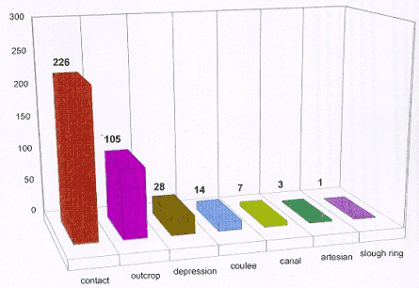| |
Salinity Distribution in the Blood Indian Reserve | |
| |
|
|
| |
|
|
| | The Blood Indian Reserve has 384 saline seeps which occupy a total of 1 833 ha (4 529 ac), representing 1.3% of the Reserve's total area. The visibly saline areas have such high salinity levels that annual crops cannot be grown and forage crops have significantly reduced yields. Often the lands surrounding the visibly saline areas are also weakly saline, resulting in reduced yields especially for salt-sensitive crops.
Salinity distribution by type in the Blood Indian Reserve
| Salinity type | Number of seeps | Area (ha) | Percent of total saline area |
| Contact/slope change | 226 | 854 | 46.5 |
| Outcrop | 105 | 595 | 32.5 |
| Depression bottom | 28 | 267 | 14.6 |
| Coulee bottom | 14 | 83 | 4.5 |
| Artesian | 3 | 5 | 0.3 |
| Slough ring | 1 | 5 | 0.3 |
| Irrigation canal seepage | 7 | 24 | 1.3 |
| Total | 384 | 1 833 | 100 |
Contact/slope change salinity occupies the greatest area (46.5% of all saline land on the Blood Reserve), followed by outcrop salinity (32.5%), depression bottom salinity (14.6%), coulee bottom (4.5%), irrigation canal seepage (1.3%), artesian (0.3%) and slough ring (0.3%). There is no evidence that natural/irrigation salinity occurs on the Reserve.
Number of saline seeps by type in the Blood Indian Reserve

Salinity type
Please refer to Salinity Classification, Mapping and Management in Alberta for more information. |
|
| |
|
|
| |
For more information about the content of this document, contact Karen Raven.
This document is maintained by Laura Thygesen.
This information published to the web on February 12, 2004.
Last Reviewed/Revised on December 4, 2017.
|
|